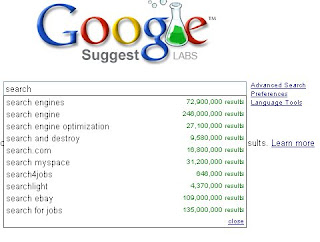- Make your title tag that is short and eye-catching, with keyword combinations if possible.
- Title tag should still reads cleanly; do not have an unintelligible keyword-stuffed title, as this will display in the search engine listing for your website.
- If you are a well-recognized brand, such as Nike, you can place your name at the beginning of the page title. This lets you build on the trust in your brand.
- Less well-known companies should place their names near the end of the title, so that a browser's focus goes to the keywords in your title.
Complete Online Web Marketing solutions | Search Engine Optimization News | Search Engine Optimization Techniques.
Friday, June 27, 2008
Focus For On-page SEO
Wednesday, June 25, 2008
Organize Your Website Into Clear Sections
Here's a basic example of good site architecture:
1. example.com/cars/
There are many advantages to have good website architecture.
Easy to maintain: when website is divided up into manageable sections it is easier to maintain than a site with an unorganized structure.
Well Defined Hierarchy: Pages with more generalized information are at the top of the hierarchy. As you navigate deeper into the site, pages present more specialized information.
Friday, June 20, 2008
What Optimal Keyword Density Should Be Used
Wednesday, June 18, 2008
Google Labs Offers Suggest Tool
Wednesday, June 11, 2008
Get Your Website Crawled Soon By Search Engine Spiders
- The reasons that Search engines crawl yours site late is because Search engine can’t see any potential links pointing to your site. So the first thing you should do to get your site faster crawled by Search engines, is to gain more quality links pointing to your website. More quality links are pointing to your site more search engines faster it crawls your site.
- If you don’t have Sitemap on your site, make one fast. Create sitemap soon with all your website links located in it and pace that on the server. Also make sure you link your sitemap to the top of the homepage only, so that when your homepage gets crawled your sitemap too gets crawled with all internal page links.
- Host is also a very important point one should take care off. If your website is hosted on slow server the possible that your website will get crawled soon will reduce a lot. So switch your website to a host server which is fast and specific.
- Updated your website with more unique information/content as regular as you can, this will show crawler that your website contains something new everytime it comes to your website.
Tuesday, June 10, 2008
Advanced Features of Google Analytics
Tracking Particular link, banner and certain country clicks and RSS feed subscribers
If you want to track how many people clicked on a particular link or banner or an affiliate link on your site? How many people from a certain country click on your banner advert or even the number of visitors from Digg that clicked to sign up to your RSS feed. Google Analytics can track this for you quite easily by simply adding an onClick event to your hyperlink code.
a href="http://www.abc.com" onClick="javascript:urchinTracker ('/outgoing/rssfeed')
Every time somebody clicks on the link above GA will register a page view on the page www.yoursite.com/outgoing/rssfeed. You can view the results in the Top content section by filtering the results by adding the term in filter box “outgoing”
